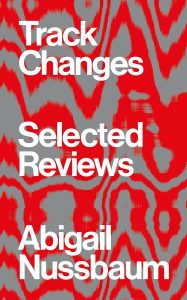Track Changes by Abigail Nussbaum: Review by Ian Mond
 Track Changes, Abigail Nussbaum (Briardene 978-1-73856-170-4, £15.00, 448pp, tp) August 2024.
Track Changes, Abigail Nussbaum (Briardene 978-1-73856-170-4, £15.00, 448pp, tp) August 2024.
In March, Abigail Nussbaum, on her blog Asking the Wrong Questions, reviewed Francis Spufford’s Cahokia Jazz, one of my favourite novels of 2024. It’s a review that encapsulates everything magnificent about Nussbaum, a well-deserved Hugo winner. First, there’s the sheer artistry, the way the review is crafted like a mystery (fitting for a noirish novel), raising questions that she then seeks to answer. Then there’s how Nussbaum builds and layers her argument: meticulous, thoughtful, sometimes passionate. I adored Cahokia Jazz and still do, but Nussbaum’s measured criticism had me reflecting on the novel’s limitations. That’s what the best critics do: they bring a new perspective to a work you may already have a firm opinion on. Nussbaum isn’t just an excellent practitioner of this; she’s one of the best within the genre and beyond. That leads me to Track Changes: Selected Reviews, Nussbaum’s first (and I hope not last) collection of criticism, previously published on her aforementioned blog, and sites like Strange Horizons and Lawyers, Guns & Money. The book, published by Briardene Books, who also released Niall Harrison’s Hugo-nominated All These Worlds: Reviews and Essays, collects over fifty pieces of criticism, involving genre novels and collections, film, and TV.
In her introduction, Nussbaum explains that the title, Track Changes, captures the book’s intent – to not only ‘‘track changes in the world – in the fields of science fiction and fantasy, [but also] my own growth as a writer and critic.’’ To achieve this, the book is structured into five sections – ‘‘Space’’, ‘‘Systems’’, ‘‘Places’’, ‘‘Bodies’’, and ‘‘Tales’’ – with the reviews in each section placed in chronological order. I want to say that I saw significant shifts in Nussbaum’s style and concerns across the decade and a half these pieces cover. But the reality is that Nussbaum appeared on the scene fully formed. Her voice, her approach, and her interests are as evident in a review of Nova Swing by M. John Harrison, published in 2006, as it is in a piece on The Moonday Letters by Emmi Itaranta, which came out 16 years later (the review that caps off the section ‘‘Space’’). I’m sure Nussbaum can point to numerous tweaks to how she structures up an argument; she might even disagree with those earlier reviews – view them as naïve or not fully fleshed out. But that’s not how I read them. If anything, Nussbaum has always been a mature, thoughtful voice, never falling prey to the latest bit of literary clickbait – unless she can embed it into her criticism as she does with her terrific review of Golem and the Jinni by Helene Wecker, where she brilliantly weaves in a provocative piece by Edward Docx about Neil Gaiman’s The Ocean at the End of the Lane.
The point I’m making is that Nussbaum has always viewed genre from a political and social conscience, starting with the question: what does this work say, if anything, about the world we live in? Or, to put it another way, while Nussbaum will talk about the aesthetics of a novel, she’s far less interested in structure and voice – unless it speaks to the broader theme. When Nussbaum quotes, it’s not to pick out a gorgeous turn of phrase but to reinforce the argument she, or the work in question, is making. That focus on the political and social should, to some degree, ‘‘date’’ these reviews. But it says something about how reactionary Western polities have become that her views on marginalisation, the environment and late-stage capitalism are still as urgent and relevant as ever.
Take her piece on Interstellar, a decade-old movie that I happened to love but that Nussbaum picks apart with precision, pointing out the way it ignores the collapse of Earth’s environment for the sense of wonder of space exploration. Why fix our planet when we can find a home elsewhere? Or her touching review of Simon Jimenez’s The Vanished Birds – a novel I’ve not read, but one Nussbaum loves – where she discusses how capitalism (not so dead) shapes the universe in which it’s set. Or her enlightening review of Arrival, a film I also enjoyed, but which Nussbaum compares to the source material, Ted Chiang’s ‘‘Story of Your Life’’, and shows, again with an elegance and clarity that’s utterly compelling, how the story’s subtle, nuanced treatment of free will is lost when converted into film. All these reviews put the social and political front and centre and are all the more fascinating and intellectually satisfying because of it.
Picking out a favourite review is a bit of a mug’s game in a book this smart and erudite. Instead, I’ll pick out two. Nussbaum’s take on Apple TV’s Severance: Season One had me viewing the show – which I thought was incredible – in a very different light. While Nussbaum, like me, enjoyed the aesthetics, she was less convinced by the show’s conceit and its narrow treatment of capitalism and class, one that elides and even erases working-class folk. Nussbaum’s critique of Batman v Superman: Dawn of Justice didn’t need to change my mind. The film was awful, and Nussbaum agrees. But rather than reheat arguments already made by every critic who saw the movie (and most of the audience), she focuses on one element: the way Batman v Superman blithely deals with depression and how that feeds into a culture of toxic masculinity. It’s an extraordinary, powerful review that finds something meaningful, even vital, to say in the most vacuous and pointless of movies.
Beyond highlighting Nussbaum’s talents and her strident interest in how speculative fiction informs our views on class, race, gender and the saving of our planet, Track Changes showcases the talent needed to author a sustained piece of criticism. There is a skill in putting together a coherent, well-judged argument, a skill we are losing rapidly. Nussbaum is a refreshing and thankful reminder that there are still critical voices worth listening to.
Interested in this title? Your purchase through the links below brings us a small amount of affiliate income and helps us keep doing all the reviews you love to read!
Ian Mond loves to talk about books. For eight years he co-hosted a book podcast, The Writer and the Critic, with Kirstyn McDermott. Recently he has revived his blog, The Hysterical Hamster, and is again posting mostly vulgar reviews on an eclectic range of literary and genre novels. You can also follow Ian on Twitter (@Mondyboy) or contact him at mondyboy74@gmail.com.
This review and more like it in the August 2024 issue of Locus.
 While you are here, please take a moment to support Locus with a one-time or recurring donation. We rely on reader donations to keep the magazine and site going, and would like to keep the site paywall free, but WE NEED YOUR FINANCIAL SUPPORT to continue quality coverage of the science fiction and fantasy field.
While you are here, please take a moment to support Locus with a one-time or recurring donation. We rely on reader donations to keep the magazine and site going, and would like to keep the site paywall free, but WE NEED YOUR FINANCIAL SUPPORT to continue quality coverage of the science fiction and fantasy field.
©Locus Magazine. Copyrighted material may not be republished without permission of LSFF.








